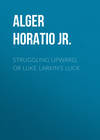Kitabı oku: «Frank's Campaign; Or, The Farm and the Camp», sayfa 8
“I’d go and fight the rebels,” said Charlie manfully.
CHAPTER XX. POMP’S EDUCATION COMMENCES
In the season of leisure from farm work which followed, Frank found considerable time for study. The kind sympathy and ready assistance given by Mr. Morton made his task a very agreeable one, and his progress for a time was as rapid as if he had remained at school.
He also assumed the office of teacher, having undertaken to give a little elementary instruction to Pomp. Here his task was beset with difficulties. Pomp was naturally bright, but incorrigibly idle. His activity was all misdirected and led him into a wide variety of mischief. He had been sent to school, but his mischievous propensities had so infected the boys sitting near him that the teacher had been compelled to request his removal.
Three times in the week, during the afternoon, Pomp came over to the farm for instruction. On the first of these occasions we will look in upon him and his teacher.
Pomp is sitting on a cricket by the kitchen fire. He has a primer open before him at the alphabet. His round eyes are fixed upon the page as long as Frank is looking at him, but he requires constant watching. His teacher sits near-by, with a Latin dictionary resting upon a light stand before him, and a copy of Virgil’s Aeneid in his hand.
“Well, Pomp, do you think you know your lesson?” he asks.
“Dunno, Mass’ Frank; I reckon so.”
“You may bring your book to me, and I will try you.”
Pomp rose from his stool and sidled up to Frank with no great alacrity.
“What’s that letter, Pomp?” asked the young teacher, pointing out the initial letter of the alphabet.
Pomp answered correctly.
“And what is the next?”
Pomp shifted from one foot to the other, and stared vacantly out of the window, but said nothing.
“Don’t you know?”
“‘Pears like I don’t ‘member him, Mass’ Frank.”
Here Frank had recourse to a system of mnemonics frequently resorted to by teachers in their extremity.
“What’s the name of the little insect that stings people sometimes, Pomp?”
“Wasp, Mass’ Frank,” was the confident reply.
“No, I don’t mean that. I mean the bee.”
“Yes, Mass’ Frank.”
“Well, this is B.”
Pomp looked at it attentively, and, after a pause, inquired, “Where’s him wings, Mass’ Frank?”
Frank bit his lips to keep from laughing. “I don’t mean that this is a bee that makes honey,” he explained, “only it has the same name. Now do you think you can remember how it is called?” “Bumblebee!” repeated Pomp triumphantly.
Pomp’s error was corrected, and the lesson proceeded.
“What is the next letter?” asked Frank, indicating it with the point of his knife-blade.
“X,” answered the pupil readily.
“No, Pomp,” was the dismayed reply. “It is very different from X.”
“Dat’s him name at school,” said Pomp positively.
“No, Pomp, you are mistaken. That is X, away down there.”
“Perhaps him change his name,” suggested Pomp.
“No. The letters never change their names. I don’t think you know your lesson, Pomp. just listen to me while I tell you the names of some of the letters, and try to remember them.”
When this was done, Pomp was directed to sit down on the cricket, and study his lesson for twenty Minutes, at the end of which he might again recite.
Pomp sat down, and for five minutes seemed absorbed in his book. Then, unfortunately, the cat walked into the room, and soon attracted the attention of the young student. He sidled from his seat so silently that Frank did not hear him. He was soon made sensible that Pomp was engaged in some mischief by hearing a prolonged wail of anguish from the cat.
Looking up, he found that his promising pupil had tied her by the leg to a chair, and under these circumstances was amusing himself by pinching her tail.
“What are you doing there, Pomp?” he asked quickly.
Pomp scuttled back to his seat, and appeared to be deeply intent upon his primer.
“Ain’t doin’ noffin’, Mass’ Frank,” he answered innocently.
“Then how came the cat tied to that chair?”
“‘Spec’ she must have tied herself.”
“Come, Pomp, you know better than that. You know cats can’t tie themselves. Get up immediately and unfasten her.”
Pomp rose with alacrity, and undertook to release puss from the thraldom of which she had become very impatient. Perhaps she would have been quite as well off if she had been left to herself. The process of liberation did not appear to be very agreeable, judging from the angry mews which proceeded from her. Finally, in her indignation against Pomp for some aggressive act, she scratched him sharply.
“You wicked old debble!” exclaimed Pomp wrathfully.
He kicked at the cat; but she was lucky enough to escape, and ran out of the room as fast as her four legs could carry her.
“Big ugly debble!” muttered Pomp, watching the blood ooze from his finger.
“What’s the matter, Pomp?”
“Old cat scratch me.”
“And what did you do to her, Pomp? I am afraid you deserved your scratch.”
“Didn’t do noffin’, Mass’ Frank,” said Pomp virtuously.
“I don’t think you always tell the truth, Pomp.”
“Can’t help it, Mass’ Frank. ‘Spec’ I’ve got a little debble inside of me.”
“What do you mean, Pomp! What put that idea in your head?”
“Dat’s what mammy says. Dat’s what she al’ays tells me.”
“Then,” said Frank, “I think it will be best to whip it out of you. Where’s my stick?”
“Oh, no, Mass’ Frank,” said Pomp, in alarm; “I’ll be good, for sure.”
“Then sit down and get your lesson.”
Again Pomp assumed his cricket. Before he had time to devise any new mischief, Mrs. Frost came to the head of the stairs and called Frank.
Frank laid aside his books, and presented himself at the foot of the stairs.
“I should like your help a few minutes. Can you leave your studies?”
“Certainly, mother.”
Before going up, he cautioned Pomp to study quietly, and not get into any mischief while he was gone. Pomp promised very readily.
Frank had hardly got upstairs before his pupil rose from the cricket, and began to look attentively about him. His first proceeding was to, hide his primer carefully in Mrs. Frost’s work-basket, which lay on the table. Then, looking curiously about him, his attention was drawn to the old-fashioned clock that stood in the corner.
Now, Pomp’s curiosity had been strongly excited by this clock. It was not quite clear to him how the striking part was effected. Here seemed to be a favorable opportunity for instituting an investigation. Pomp drew his cricket to, the clock, and, opening it, tried to reach up to the face. But he was not yet high enough. He tried a chair, and still required a greater elevation. Espying Frank’s Latin dictionary, he pressed that into service.
By and by Frank and his mother heard the clock striking an unusual number of times.
“What is the matter with the clock?” inquired Mrs. Frost.
“I don’t know,” said Frank unsuspiciously.
“It has struck ten times, and it is only four o’ clock.”
“I wonder if Pomp can have got at it,” said Frank, with a sudden thought.
He ran downstairs hastily.
Pomp heard him coming, and in his anxiety to escape detection, contrived to lose his balance and fall to the floor. As he fell, he struck the table, on which a pan of sour milk had been placed, and it was overturned, deluging poor Pomp with the unsavory fluid.
Pomp shrieked and kicked most energetically. His appearance, as he picked himself up, was ludicrous in the extreme. His sable face was plentifully besprinkled with clotted milk, giving him the appearance of a negro who is coming out white in spots. The floor was swimming in milk. Luckily the dictionary had fallen clear of it, and so escaped.
“Is this the way you study?” demanded Frank, as sternly as his sense of the ludicrous plight in which he found Pomp would permit.
For once Pomp’s ready wit deserted him. He had nothing to say.
“Go out and wash yourself.”
Pomp came back rather shamefaced, his face restored to its original color.
“Now, where is your book?”
Pomp looked about him, but, as he took good care not to look where he knew his book to be, of course he did not find it.
“I ‘clare, Mass’ Frank, it done lost,” he at length asserted.
“How can it be lost when you had it only a few minutes ago?”
“I dunno,” answered Pomp stolidly.
“Have you been out of the room?”
Pomp answered in the negative.
“Then it must be somewhere here.”
Frank went quietly to the corner of the room and took therefrom a stick.
“Now, Pomp,” he said, “I will give you just two minutes to find the book in. If you don’t find it, I shall have to give you a whipping.”
Pomp looked at his teacher to see if he was in earnest. Seeing that he was, he judged it best to find the book.
Looking into the work-box, he said innocently: “I ‘clare to gracious, Mass’ Frank, if it hasn’t slipped down yere. Dat’s mi’ty cur’s, dat is.”
“Pomp, sit down,” said Frank. “I am going to talk to you seriously. What makes you tell so many lies?”
“Dunno any better,” replied Pomp, grinning.
“Yes, you do, Pomp. Doesn’t your mother tell you not to lie?”
“Lor’, Mass’ Frank, she’s poor ignorant nigger. She don’t know nuffin’.”
“You mustn’t speak so of your mother. She brings you up as well as she knows how. She has to work hard for you, and you ought to love her.”
“So I do, ‘cept when she licks me.”
“If you behave properly she won’t whip you. You’ll grow up a ‘poor, ignorant nigger’ yourself, if you don’t study.”
“Shall I get white, Mass’ Frank, if I study?” asked Pomp, showing a double row of white teeth.
“You were white enough just now,” said Frank, smiling.
“Yah, yah!” returned Pomp, who appreciated the joke.
“Now, Pomp,” Frank continued seriously, “if you will learn your lesson in fifteen minutes I will give you a piece of gingerbread.”
“I’ll do it, Mass’ Frank,” said Pomp promptly.
Pomp was very fond of gingerbread, as Frank very well knew. In the time specified the lesson was got, and recited satisfactorily.
As Pomp’s education will not again be referred to, it may be said that when Frank had discovered how to manage him, he learned quite rapidly. Chloe, who was herself unable to read, began to look upon Pomp with a new feeling of respect when she found that he could read stories in words of one syllable, and the “lickings” of which he complained became less frequent. But his love of fun still remained, and occasionally got him into trouble, as we shall hereafter have occasion to see.
CHAPTER XXI. THE BATTLE OF FREDERICKSBURG
About the middle of December came the sad tragedy of Fredericksburg, in which thousands of our gallant soldiers yielded up their lives in a hard, unequal struggle, which brought forth nothing but mortification and disaster.
The first telegrams which appeared in the daily papers brought anxiety and bodings of ill to many households. The dwellers at the farm were not exempt. They had been apprised by a recent letter that Mr. Frost’s regiment now formed a part of the grand army which lay encamped on the eastern side of the Rappahannock. The probability was that he was engaged in the battle. Frank realized for the first time to what peril his father was exposed, and mingled with the natural feeling which such a thought was likely to produce was the reflection that, but for him, his father would have been in safety at home.
“Did I do right?” Frank asked himself anxiously, the old doubt recurring once more.
Then, above the selfish thought of peril to him and his, rose the consideration of the country’s need, and Frank said to himself, “I have done right—whatever happens. I feel sure of that.”
Yet his anxiety was by no means diminished, especially when, a day or two afterward, tidings of the disaster came to hand, only redeemed by the masterly retreat across the river, in which a great army, without the loss of a single gun, ambulance, or wagon, withdrew from the scene of a hopeless struggle, under the very eyes of the enemy, yet escaping discovery.
One afternoon Frank went to the post-office a little after the usual time. As he made his way through a group at the door, he notice compassionate glances directed toward him.
His heart gave a sudden bound.
“Has anything happened to my father?” he inquired, with pale face. “Have any of you heard anything?”
“He is wounded, Frank,” said the nearest bystander.
“Show it to me,” said Frank.
In the evening paper, which was placed in his hands, he read a single line, but of fearful import: “Henry Frost, wounded.” Whether the wound was slight or serious, no intimation was given.
Frank heaved a sigh of comparative relief. His father was not dead, as he at first feared. Yet he felt that the suspense would be a serious trial. He did not know how to tell his mother. She met him at the gate. His serious face and lagging steps revealed the truth, exciting at first apprehensions of something even more serious.
For two days they remained without news. Then came a letter from the absent father, which wonderfully lightened all their hearts. The fact that he was able to write a long letter with his own hand showed plainly that his wound must be a trifling one. The letter ran thus:
“DEAR MARY: I fear that the report of my wound will reach you before this letter comes to assure you that it is a mere scratch, and scarcely worth a thought. I cannot for an instant think of it, when I consider how many of our poor fellows have been mown down by instant death, or are now lying with ghastly wounds on pallets in the hospital. We have been through a fearful trial, and the worst thought is that our losses are not compensated by a single advantage.
“Before giving you an account of it from the point of view of a private soldier, let me set your mind at rest by saying that my injury is only a slight flesh-wound in the arm, which will necessitate my carrying it in a sling for a few days; that is all.
“Early on the morning of Thursday, the 10th inst., the first act in the great drama commenced with laying the pontoon bridges over which our men were to make their way into the rebel city. My own division was to cross directly opposite the city. All honor to the brave men who volunteered to lay the bridges. It was a trying and perilous duty. On the other side, in rifle-pits and houses at the brink of the river, were posted the enemy’s sharpshooters, and these at a given signal opened fire upon our poor fellows who were necessarily unprotected. The firing was so severe and deadly, and impossible to escape from, that for the time we were obliged to desist. Before anything could be effected it became clear that the sharpshooters must be dislodged.
“Then opened the second scene.
“A deluge of shot and shell from our side of the river rained upon the city, setting some buildings on fire, and severely damaging others. It was a most exciting spectacle to us who watched from the bluffs, knowing that ere long we must make the perilous passage and confront the foe, the mysterious silence of whose batteries inspired alarm, as indicating a consciousness of power.
“The time of our trial came at length.
“Toward the close of the afternoon General Howard’s division, to which I belong, crossed the pontoon bridge whose building had cost us more than one gallant soldier. The distance was short, for the Rappahannock at this point is not more than a quarter of a mile wide. In a few minutes we were marching through the streets of Fredericksburg. We gained possession of the lower streets, but not without some street fighting, in which our brigade lost about one hundred in killed and wounded.
“For the first time I witnessed violent death. The man marching by my side suddenly reeled, and, pressing his hand to his breast, fell forward. Only a moment before he had spoken to me, saying, ‘I think we are going to have hot work.’ Now he was dead, shot through the heart. I turned sick with horror, but there was no time to pause. We must march on, not knowing that our turn might not come next. Each of us felt that he bore his life in his hand.
“But this was soon over, and orders came that we should bivouac for the night. You will not wonder that I lay awake nearly the whole night. A night attack was possible, and the confusion and darkness would have made it fearful. As I lay awake I could not help thinking how anxious you would feel if you had known where I was.
“So closed the first day.
“The next dawned warm and pleasant. In the quiet of the morning it seemed hard to believe that we were on the eve of a bloody struggle. Discipline was not very strictly maintained. Some of our number left the ranks and ransacked the houses, more from curiosity than the desire to pillage.
“I went down to the bank of the river, and took a look at the bridge which it had cost us so much trouble to throw across. It bore frequent marks of the firing of the day previous.
“At one place I came across an old negro, whose white head and wrinkled face indicated an advanced age. Clinging to him were two children, of perhaps four and six years of age, who had been crying.
“‘Don’t cry, honey,’ I heard him say soothingly, wiping the tears from the cheeks of the youngest with a coarse cotton handkerchief.
“‘I want mama,’ said the child piteously.
“A sad expression came over the old black’s face.
“‘What is the matter?’ I asked, advancing toward him.
“‘She is crying for her mother,’ he said.
“‘Is she dead?’
“‘Yes, sir; she’d been ailing for a long time, and the guns of yesterday hastened her death.’
“‘Where did you live?’
“‘In that house yonder, sir.’
“‘Didn’t you feel afraid when we fired on the town?’
“‘We were all in the cellar, sir. One shot struck the house, but did not injure it much.’
“‘You use very good language,’ I could not help saying.
“‘Yes, sir; I have had more advantages than most of—of my class.’ These last words he spoke rather bitterly. ‘When I was a young man my master amused himself with teaching me; but he found I learned so fast that he stopped short. But I carried it on by myself.’
“‘Didn’t you find that difficult?’
“‘Yes, sir; but my will was strong. I managed to get books, now one way, now another. I have read considerable, sir.’
“This he said with some pride.
“‘Have you ever read Shakespeare?’
“‘In part, sir; but I never could get hold of “Hamlet.” I have always wanted to read that play.’
“I drew him out, and was astonished at the extent of his information, and the intelligent judgment which he expressed.
“‘I wonder that, with your acquirements, you should have been content to remain in a state of slavery.’
“‘Content!’ he repeated bitterly. ‘Do you think I have been content? No, sir. Twice I attempted to escape. Each time I was caught, dragged back, and cruelly whipped. Then I was sold to the father of these little ones. He treated me so well, and I was getting so old, that I gave up the idea of running away.’
“‘And where is he now?’
“‘He became a colonel in the Confederate service, and was killed at Antietam. Yesterday my mistress died, as I have told you.’
“‘And are you left in sole charge of these little children?’
“‘Yes, sir.’
“‘Have they no relatives living?’
“‘Their uncle lives in Kentucky. I shall try to carry them there.’
“‘But you will find it hard work. You have only to cross the river, and in our lines you will be no longer a slave.’
“‘I know it, sir. Three of my children have got their freedom, thank God, in that way. But I can’t leave these children.’
“I looked down at them. They were beautiful children. The youngest was a girl, with small features, dark hair, and black eyes. The boy, of six, was pale and composed, and uttered no murmur. Both clung confidently to the old negro.
“I could not help admiring the old man, who could resist the prospect of freedom, though he had coveted it all his life, in order to remain loyal to his trust. I felt desirous of drawing him out on the subject of the war.
“‘What do you think of this war?’ I asked.
“He lifted up his hand, and in a tone of solemnity, said, ‘I think it is the cloud by day, and the pillar of fire by night, that’s going to draw us out of our bondage into the Promised Land.’
“I was struck by his answer.
“‘Do many of you—I mean of those who have not enjoyed your advantages of education—think so?’
“‘Yes, sir; we think it is the Lord’s doings, and it is marvelous in our eyes. It’s a time of trial and of tribulation; but it isn’t a-going to last. The children of Israel were forty years in the wilderness, and so it may be with us. The day of deliverance will come.’
“At this moment the little girl began again to cry, and he addressed himself to soothe her.
“This was not the only group I encountered. Some women had come, down to the river with children half-bereft of their senses—some apparently supposing that we should rob or murder them. The rebel leaders and newspapers have so persistently reiterated these assertions, that they have come to believe them.
“The third day was unusually lovely, but our hearts were too anxious to admit of our enjoying it. The rebels were entrenched on heights behind the town. It was necessary that these should be taken, and about noon the movement commenced. Our forces marched steadily across the intervening plain. The rebels reserved their fire till we were half-way across, and then from all sides burst forth the deadly fire. We were completely at their mercy. Twenty men in my own company fell dead or wounded, among them the captain and first lieutenant. Of what followed I can give you little idea. I gave myself up for lost. A desperate impulse enabled me to march on to what seemed certain destruction. All at once I felt a sensation of numbness in my left arm, and looking down, I saw that the blood was trickling from it.
“But I had little time to think of myself. Hearing a smothered groan, I looked round, and saw Frank Grover, pale and reeling.
“‘I’m shot in the leg,’ he said. ‘Don’t leave me here. Help me along, and I will try to keep up with you.’
“The poor lad leaned upon me, and we staggered forward. But not for long. A stone wall stared us in the face. Here rebel sharpshooters had been stationed, and they opened a galling fire upon us. We returned it, but what could we do? We were compelled to retire, and did so in good order, but unfortunately not until the sharpshooters had picked off some of our best men.
“Among the victims was the poor lad whom I assisted. A second bullet struck him in the heart. He uttered just one word, ‘mother,’ and fell. Poor boy, and poor mother! He seemed to have a premonition of his approaching death, and requested me the day previous to take charge of his effects, and send them with his love and a lock of his hair to his mother if anything should befall him. This request I shall at once comply with. I have succeeded in getting the poor fellow’s body brought to camp, where it will be decently buried, and have cut from his head two brown locks, one for his mother, and one for myself.
“At last we got back with ranks fearfully diminished. Many old familiar faces were gone—the faces of those now lying stiff and stark in death. More were groaning with anguish in the crowded hospital. My own wound was too trifling to require much attention. I shall have to wear a sling for a few days perhaps.
“There is little more to tell. Until Tuesday evening we maintained our position in daily expectation of an attack. But none was made. This was more fortunate for us. I cannot understand what withheld the enemy from an assault.
“On Tuesday suddenly came the order to re-cross the river. It was a stormy and dreary night, and so, of course, favorable to our purpose. The maneuver was executed in silence, and with commendable expedition. The rebels appeared to have no suspicion of General Burnside’s intentions. The measured beat of our double quick was drowned by the fury of the storm, and with minds relieved, though bodies drenched, we once more found ourselves with the river between us and our foes. Nothing was left behind.
“Here we are again, but not all of us. Many a brave soldier has breathed his last, and lies under the sod. ‘God’s ways are dark, but soon or late they touch the shining hills of day.’ So sings our own Whittier, and so I believe, in spite of the sorrowful disaster which we have met with. It is all for the best if we could but see it.
“Our heavy losses of officers have rendered some new appointments necessary. Our second lieutenant has been made captain. The orderly sergeant and second sergeant are now our lieutenants, and the line of promotion has even reached me. I am a corporal.
“I have been drawn into writing a very long letter, and I must now close, with the promise of writing again very soon. After I have concluded, I must write to poor Frank Grover’s mother. May God comfort her, for she has lost a boy of whom any mother might feel proud.
“With love to the children, I remain, as ever, your affectionate husband. HENRY FROST.”
“How terrible it must have been,” said Mrs. Frost, with a shudder, as she folded up the letter and laid it down. “We ought indeed to feel thankful that your father’s life was spared.”
“If I were three years older, I might have been in the battle,” thought Frank.










